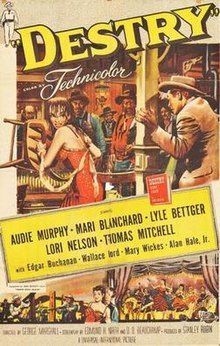Destry (film)
| Destry | |
|---|---|
 | |
| Directed by | George Marshall |
| Written by | Max Brand (novel Destry Rides Again) |
| Screenplay by | Edmund H. North D.D. Beauchamp |
| Story by | Felix Jackson |
| Produced by | Stanley Rubin |
| Starring | Audie Murphy Mari Blanchard Lyle Bettger Thomas Mitchell |
| Cinematography | George Robinson |
| Edited by | Ted J. Kent |
| Music by | Henry Mancini Frank Skinner Herman Stein |
Production company | Universal International |
| Distributed by | Universal International |
Release date |
|
Running time | 95 minutes |
| Country | United States |
| Language | English |
| Box office | $1.5 million (US)[1] |
Destry is a 1954 American Technicolor Western film starring Audie Murphy, Mari Blanchard, Lyle Bettger and Thomas Mitchell. The third film version of Max Brand's Destry Rides Again, this 1954 version is closer to the 1939 Marlene Dietrich and James Stewart film version than it is to the Brand original. Indeed, Halliwell's Film Guide calls it an "almost scene-for-scene remake."[2] George Marshall directed both versions.
Plot
This section needs expansion. You can help by adding to it. (January 2009) |
The sheriff of a small western town dies of a heart attack and the crooked mayor, The Honorable Hiram J. Sellers (Edgar Buchanan), and leading crook Phil Decker (Lyle Bettger) appoint the town drunk, Reginald T. "Rags" Barnaby (Thomas Mitchell), as the new sheriff, believing that he will be easily controlled by them. Rags, however, announces he is giving up drinking and refuses to accept Decker as his new deputy, telling them that he has someone else in mind: Tom Destry.
Destry (Audie Murphy) arrives on the stagecoach with great fanfare, but Rags is disappointed to find out that he is a very young man and refuses to carry a gun. Destry finds out that the previous sheriff may not have died of a heart attack as had been claimed. He suspects that the sheriff was actually murdered while trying to resolve a land dispute, and he sets about finding out how the sheriff actually died. Eventually it becomes clear that Decker killed the sheriff in order to further his plans to obtain all the land necessary to control and exploit the transit of cattle over those properties. After a gun battle in the saloon, Destry restores law and order to the town.
Cast
- Audie Murphy as Tom Destry, Jr., the new deputy
- Mari Blanchard as Brandy, the saloon singer
- Lyle Bettger as Phil Decker, mob boss
- Thomas Mitchell as Reginald T. "Rags" Barnaby, new sheriff
- Lori Nelson as Martha Phillips
- Alan Hale, Jr. as Jack Larson
- Wallace Ford as Doc Curtis
- Mary Wickes as Bessie Mae Curtis
- George Wallace as Curly Adams
- Edgar Buchanan as The Honorable Hiram J. Sellers, Mayor
- Mitchell Lawrence as The Professor
References
- ^ 'The Top Box-Office Hits of 1955', Variety Weekly, January 25, 1956
- ^ John Walker, ed. (1994). Halliwells Film Guide 10th edition. Harper Collins. p. 288. ISBN 0-00-638389-0.
External links
- Destry at IMDb
- Destry at the TCM Movie Database
- Destry at Audie Murphy Memorial Site
